|
|
|
Sort Order |
|
|
|
Items / Page
|
|
|
|
|
|
|
| Srl | Item |
| 1 |
ID:
119719
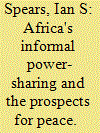

|
|
|
|
|
| Publication |
2013.
|
| Summary/Abstract |
Power-sharing and inclusion continue to inform contemporary approaches to conflict resolution and post-conflict governance in Africa. But aside from power-sharing efforts in relatively well-institutionalized countries such as South Africa and Rhodesia/Zimbabwe, most efforts at formal inclusion have been short-lived. Indeed, many high-profile experiences in power-sharing governments have been failures. African governments and opposition groups do engage in inclusion, but, owing to the non-institutionalized nature of African politics, it is almost always directed toward more limited short-term objectives such as regime survival or material reward that comes with participation in peace processes. Surveying Africa's experience with power-sharing, this article argues that inclusion continues to be a fragile basis on which to build peace.
|
|
|
|
|
|
|
|
|
|
|
|
|
|
|
|
| 2 |
ID:
105399


|
|
|
|
|
| Publication |
2011.
|
| Summary/Abstract |
This is an extended version of Philip Murphy's inaugural lecture as director of the Institute of Commonwealth Studies, delivered on 23 February 2011. It traces the relationship of the UK with the wider Commonwealth over 40 years, paying particular attention to the rhetoric of governments and opposition parties from Wilson and Heath to Cameron. It examines the reasons for the Commonwealth being relegated to a peripheral role in British foreign policy, especially European preoccupations and the issues of Rhodesia and South Africa. It argues that the Commonwealth remains of considerable practical and enormous symbolic importance to the UK. The British government should engage with the Commonwealth more than it has done in the recent past and the Commonwealth should be both open to and critical of its imperial past.
|
|
|
|
|
|
|
|
|
|
|
|
|
|
|
|
| 3 |
ID:
143508
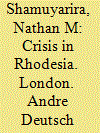

|
|
|
|
|
| Publication |
London, Andre Deutsch Limited, 1965.
|
| Description |
240p.hbk
|
|
|
|
|
|
|
|
|
|
|
|
Copies: C:1/I:0,R:0,Q:0
Circulation
| Accession# | Call# | Current Location | Status | Policy | Location |
| 000676 | 968.9104/SHA 000676 | Main | On Shelf | General | |
|
|
|
|
| 4 |
ID:
087307


|
|
|
|
|
| Publication |
2009.
|
| Summary/Abstract |
Where two opposing sides are engaged in violent conflict and a process of political disintegration, the ability to protect an already-contested legitimacy becomes crucial to a negotiated agreement. Lord Carrington, the mediator between the government of Zimbabwe-Rhodesia and the guerrilla forces of the Patriotic Front, helped the parties save face at the Lancaster House Conference in 1979. Using a tactic of strong third-party mediation, Carrington accepted responsibility for the concessions the opposing delegations made, allowing them to protect their reputation among supporters. This paper examines the three primary ways the parties at Lancaster House attempted to save face: using the mediator as scapegoat, engaging in sharp confrontation in public and flexible conciliation in private, and conducting "shadow" negotiations through Commonwealth Secretary-General Sir Shridath Ramphal.
|
|
|
|
|
|
|
|
|
|
|
|
|
|
|
|
| 5 |
ID:
158514
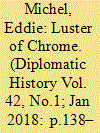

|
|
|
|
|
| Summary/Abstract |
My article discusses the tilt towards the white minority regimes of southern Africa, specifically Rhodesia that occurred during the Nixon era. The White House approach was shaped by anti-communism and economic interest combined with an apathy for the cause of black liberation. This led to a blatant disregard of the principle of majority rule and open violation of UN sanctions. Furthermore, as Nixon’s actions regarding southern Africa were reflective of core beliefs within the White House of how to approach international politics, Rhodesia provides an illuminative lens regarding the broader imperatives that guided the Nixonian approach to global relations.
|
|
|
|
|
|
|
|
|
|
|
|
|
|
|
|
| 6 |
ID:
184734
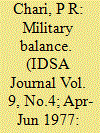

|
|
|
| 7 |
ID:
137923
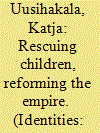

|
|
|
|
|
| Summary/Abstract |
This article examines a child migration scheme which aimed at permanently resettling British children to Southern Rhodesia during 1946–1962. First, the philanthropic scheme was framed in terms of child welfare; it sought to benefit selected children by removing them from their homes and resettling them at Rhodesia Fairbridge Memorial College, a boarding school and children’s home. Second, the scheme aimed at advancing Empire building more broadly by increasing the number of white citizens in Africa. The article considers how the Fairbridge scheme distinctively combined physical and social mobility. The children were expected, through first-class education, to rise to privileged positions, thus maintaining the colonial, racially segregated social hierarchy. By focusing on implicit forms of education at the boarding school, analysed as a ‘Goffmanian’ total institution, the article considers the ambiguous intents and outcomes of a very particular project of colonial social engineering.
|
|
|
|
|
|
|
|
|
|
|
|
|
|
|
|
| 8 |
ID:
140668


|
|
|
|
|
| Publication |
New York, Orbis Books, 1974.
|
| Description |
xii, 177p.hbk
|
| Standard Number |
0883444356
|
|
|
|
|
|
|
|
|
|
|
|
Copies: C:1/I:0,R:0,Q:0
Circulation
| Accession# | Call# | Current Location | Status | Policy | Location |
| 017807 | 968.9104/KAP 017807 | Main | On Shelf | General | |
|
|
|
|
| 9 |
ID:
040518
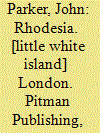

|
|
|
|
|
| Publication |
London, Pitman Publishing, 1972.
|
| Description |
viii,166p.Hbk
|
| Standard Number |
0273361678
|
|
|
|
|
|
|
|
|
|
|
|
Copies: C:1/I:0,R:0,Q:0
Circulation
| Accession# | Call# | Current Location | Status | Policy | Location |
| 011499 | 920.56891/PAR 011499 | Main | On Shelf | General | |
|
|
|
|
| 10 |
ID:
162732
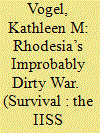

|
|
|
|
|
| Summary/Abstract |
Glenn Cross’s account of Rhodesia’s use of biological weapons suggests that even taboo weapons remain attractive as military equalisers.
|
|
|
|
|
|
|
|
|
|
|
|
|
|
|
|
| 11 |
ID:
184839
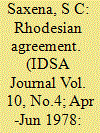

|
|
|
| 12 |
ID:
050376
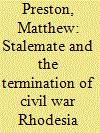

|
|
|
| 13 |
ID:
120932


|
|
|
|
|
| Publication |
2013.
|
| Summary/Abstract |
Rhodesia, a breakaway British colony, was engulfed in an insurgency through much of its short history. African guerillas, rebelling against the white minority government, have killed many more African civilians during the war-the same group that formed their base of support-than either government soldiers or European civilians. The violence was not only intended to punish enemies of the guerilla-traitors or collaborators with the government. Nor was it the result of lack of popular support. Violence forced guerilla sympathizers to actively support the insurgency or participate in it, despite the considerable risks this participation carried. Political support should not be mistaken with mobilization. Without violence, the lack of benefits and the danger of government reprisal may have kept many from actively assisting the insurgency, despite politically identifying with the guerillas and hoping for their victory.
|
|
|
|
|
|
|
|
|
|
|
|
|
|
|
|
| 14 |
ID:
099988
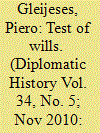

|
|
|
|
|
| Publication |
2010.
|
| Summary/Abstract |
Until 1975, Washington paid little attention to southern Africa, a backwater in the Cold War where weak insurgencies posed little threat to white rule in Angola, Mozambique, Rhodesia, and Namibia. The collapse of the Portuguese dictatorship in April 1974 meant the end of white rule in Angola and Mozambique. The Cuban victory in Angola the following year propelled southern Africa into the vortex of the Cold War. Between 1977 and 1981, the Carter administration engaged in a complicated minuet with South Africa and the Namibian rebels to craft a negotiated settlement that would grant Namibia its independence. Secretary of State Cyrus Vance and National Security Adviser Zbigniew Brzezinski clashed over the course the United States should follow, while Cuba and the Soviet Union strongly supported the Namibian insurgents and 20,000 Cuban soldiers were poised in neighboring Angola. I analyze the failure of Carter's Namibia policy based on US, Cuban and South African documents, as well as interviews with Namibian, US, Cuban and South African protagonists.
|
|
|
|
|
|
|
|
|
|
|
|
|
|
|
|
| 15 |
ID:
143502
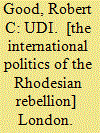

|
|
|
|
|
| Publication |
London, Faber and Faber, 1973.
|
| Description |
368p.: ill.hbk
|
| Standard Number |
0571103561
|
|
|
|
|
|
|
|
|
|
|
|
Copies: C:1/I:0,R:0,Q:0
Circulation
| Accession# | Call# | Current Location | Status | Policy | Location |
| 018077 | 968.9104/GOO 018077 | Main | On Shelf | General | |
|
|
|
|
| 16 |
ID:
074729
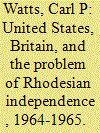

|
|
|
| 17 |
ID:
080088
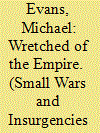

|
|
|
|
|
| Publication |
2007.
|
| Summary/Abstract |
This article examines the vital importance of political ideology in formulating effective counterinsurgency, by examining the case of Rhodesia between 1965 and 1980. During this period, the Rhodesian Front (RF) Government of Ian Smith adopted a radical right-wing 'world-struggle ideology' to justify settler resistance to African decolonisation. The RF's ideology, based on settler-status anxiety, upheld a conspiratorial interpretation of modern politics that emphasised virulent forms of Anglophobia, anti-communism, anti-internationalism and anti-liberalism. The Smith Government portrayed African nationalism not as an indigenous political phenomenon, but as an external instrument of world communism and Western appeasement. After 1972, when Rhodesia faced a protracted insurgency, many of the principles of RF ideology were applied to counterinsurgency warfare with disastrous results. Because the Rhodesian Government viewed African guerrilla warfare as unrelated to domestic politics, Rhodesian counterinsurgency lacked a realistic political dimension. The dictates of settler ideology blinded the Rhodesian Government to the vital need to win 'hearts and minds' by applying timely principles of political pacification and reform to its counterinsurgency effort. Instead a Rhodesian counterinsurgency campaign of maximum force was pursued. Such a campaign proved counter-productive accelerating strategic deterioration and leading ultimately to the political victory of the African guerrilla cause in 1980
|
|
|
|
|
|
|
|
|
|
|
|
|
|
|
|
|
|
|
|
|